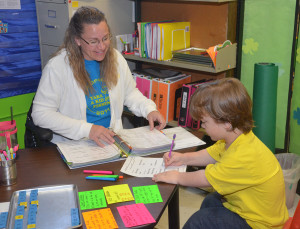
© 2015 by Steve Brawner Communications, Inc.
FLIPPIN – Superintendent Dale Query has spent more than four decades in education, and one thing that has remained constant is smart kids struggling in school and often becoming discipline problems.
He and his fellow educators in Flippin long have struggled to find the key to helping those students reach their potential. Now they think they’ve found it. Many of them have dyslexia.
The condition, which is surprisingly common at varying degrees, is a language-based learning challenge based on brain structure. The students often are smart – sometimes very smart – but they just can’t read well or put things on paper, so from their earliest days in school, they begin falling behind their peers. Teachers tell their parents they don’t apply themselves. Some students make frequent trips to the principal’s office.
A couple of years ago, a school employee brought her grandchild to the elementary office and said the child was dyslexic. Principal Tracie Luttrell, who in the past had dismissed the condition per her training, decided to attend a seminar, and something clicked. Inspired, she and others began researching the condition.
The north-central Arkansas district has made dyslexia a top priority. Many staff members attended a Saturday training on their own time as the program was starting. Six full-time interventionists work one-on-one with students. The district has 800 students, and 107 of them last year attended hourly summer school sessions twice a week. Many saw significant improvements.
The district relies on the Susan Barton method, which uses multiple senses – sight, sound, touch – to help students’ left and right brains make the proper connections to make reading easier. In a room dedicated to dyslexia, students drag tiles with letters down a magnetic board as they learn the sounds those letters make. Tiles for more advanced students have groups of letters so that those developing brains can make the connection that “o-l-d” always says “old” when it’s part of a longer word. Students also are drilled in English grammar rules until they know enough to put a newspaper editor to shame. Did you know there’s a reason why “truck” ends in “ck” but “milk” needs only a “k”? These students do.
Juanelle Potter, one of the interventionists working with students, has a special reason for working what she calls “by far the greatest job I’ve ever had.” Her husband, a math whiz, and two of her children have dyslexia. Homework was a nightly battle. Now, the daughter who would tell her, “I’m stupid” has been invited to the freshman honors banquet. Her fifth-grade son, Raymond, is no longer falling behind his peers. “I thought I wasn’t that smart,” he told me. He wants to be a mechanical engineer someday.
For some students, the program will be the difference between reading well and a lifetime of near illiteracy. But Luttrell said the benefits have gone far beyond that small population. For the first time in her educational career, she’s ready to move students out of special education, which will allow those teachers to focus on those remaining. Students are graduating out of speech therapy more quickly. Meanwhile, students with mild dyslexic characteristics who were making “C’s” – and therefore not drawing much attention – are doing better in school. Counselor Sherry Rainbolt says students she was counseling with dyslexia no longer struggle with anger or motivation issues.
“Once they’re told that there’s a reason, it’s instantaneous that they know, ‘Well, I’m not dumb. Nothing’s wrong with me, really.’ I mean, this is something that we can help them with, and they see hope,” she said.
Query uses a pretty strong descriptor: “cured for life.” Students who were being left behind in school are catching up to their peers and will never fall behind again. He sees it as the answer to a lot of problems. He says certain students no longer will need therapy, or medication, or, eventually, wind up in jail.
“When we spread those numbers out from Flippin, Arkansas, to the state of Arkansas to our nation, dyslexia intervention has the potential of reshaping our whole society,” he said.
Thanks to laws sponsored during the past two legislative sessions by Sen. Joyce Elliott, D-Little Rock, school districts across the state will screen students for dyslexia in grades K-2, and in other grades where appropriate. Then they’ll be required to intervene.
Will they look to Flippin’s example? They will if they’re smart.
I’m a literacy tutor for Benton County. One of my students is a 79 year old man who is severely dyslexic. He was unable to advance in school when a child because of his inability to read. The teachers didn’t know what to do with him back then, and everyone made fun of him. He isn’t stupid. He went on to learn skills and make a living for himself and his wife, but he has always lived with the shame and disappointment of his days in school. No person should ever be treated this way. Thank God we are making advancements and giving hope to people like him.
Hi, Sandy. I’m glad you are a literacy tutor. A few years ago I was on the board of the Arkansas Literacy Councils. Adult literacy is an important issue that’s often ignored. You’ll open up a world to him that has been closed until now. Thanks for doing that.